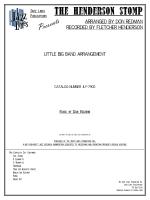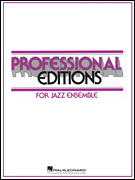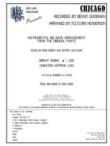HENDERSON STOMP, THE
Recorded by Fletcher Henderson
Arranged by Fletcher Henderson, Transcribed by Dylan Canterbury, Edited by Rob DuBoff and Jeffrey Sultanof

Cat #: JLP-7902
$50.00This item usually ships within 1 business day.
Questions?
Please call +1-518-587-1102 or email us.
Edition: Jazz Little Big Band Arrangement
Description: Swing - Difficult
Publisher: Jazz Lines Publications
The Henderson Stomp serves as an important document of the early days of jazz in New York City for multiple reasons. First, the arrangement showcases jazz's first great big band, the Fletcher Henderson Orchestra, at their musical peak. Second, it serves as an excellent example of Fletcher Henderson beginning to emerge as one of, if not the first, great arrangers in jazz. Third, it is a wonderful collaboration between Henderson and one of the key personalities in jazz at the time: keyboard wizard Fats Waller.
The Henderson Stomp is quite similar to ragtime in terms of how its form is structured, but manages to break away from that older style by mimicking the stride piano approach of its featured soloist, Waller. Right off the bat, the arrangement makes it known that you will need a trio of strong clarinetists to make things work with a briskly descending-then-ascending break that is also copied by the piano. The first portion of the melody at measure 9 features some more fast arpeggiated runs in the clarinets over the steadily riffing brass and rhythm section.
The clarinets and brass trade their own interpretations of the melody's next main motif back and forth at measures 18 and 30, respectively, before yielding the spotlight to Waller's infectious piano at measure 46. Coming out of Waller's solo is a key change at measure 62 that sees a brief brass figure set up a trumpet solo that extends up until the return to the original key at measure 94. The clarinets resume the initial melody before everyone comes together for one final charge at measure 118 that barrels forth until a variation of the initial clarinet riff tags itself as things taper down to a whisper - but not before the brass close things off with an abrupt honk.
3 Clarinets
3 Trumpets
Trombone
Tuba (or Acoustic Bass)
Banjo (or Guitar)
Piano
Drum Set
Acoustic Bass (Optional Alternate Part for Tuba)
Trombone: A4












